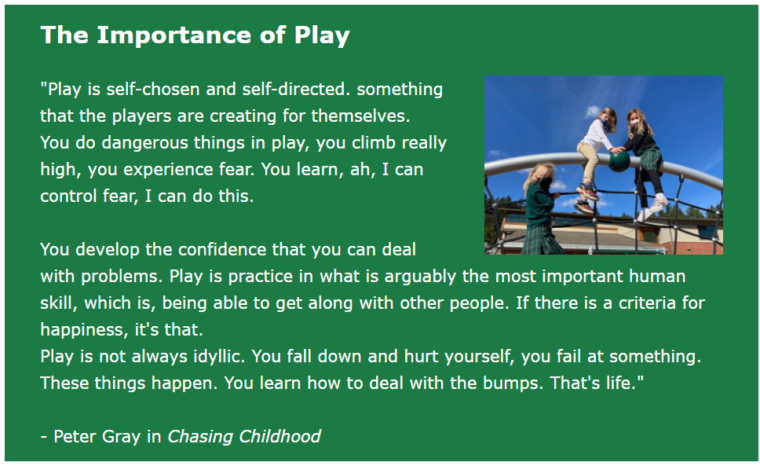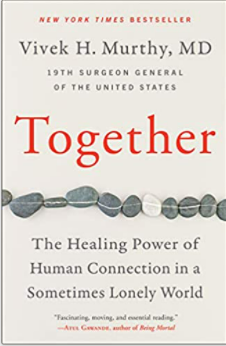






Next Week Let Grow Meets with The Surgeon General!
For real. Thursday, Let Grow and the Surgeon General will be connecting.
Here’s why: At the end of 2021, the General put out a report on Protecting Youth Mental Health. There’s reason for concern, he wrote — a big reason:
In 2019, one in three high school students and half of female students reported persistent feelings of sadness or hopelessness, an overall increase of 40% from 2009.
And that was before COVID! Now?
It would be a tragedy if we beat back one public health crisis only to allow another to grow in its place. That’s why I am issuing this Surgeon General’s Advisory. Mental health challenges in children, adolescents, and young adults are real, and they are widespread. But most importantly, they are treatable, and often preventable.
Right on!
At Let Grow, we’re in the prevention business, too, and it is thrilling to get on the Surgeon General’s radar.
A few years back, the General wrote a fantastic book I’m enjoying and underlining madly: “Together: The Healing Power of Human Connection in a Sometimes Lonely World.” After discussing how lonely he often felt as a child, he goes on to explain that loneliness is a serious problem, and an unacknowledged source of many physical and mental illnesses.
And yet, it also serves a purpose: We feel pain when we’re lonely for the same reason we feel pain when we stub our toe or burn our hand: Our body is letting us know know something is wrong and we must change course. Take action! Hurry!
Loneliness tells us we must reconnect to people, purpose, or both (they often go together), lest we end up in even more pain.
So how does all this fit with Let Grow?
In his report on youth depression, anxiety and even suicide, Murthy writes:
Scientists have proposed various hypotheses to explain these trends. While some believe that the trends in reporting of mental health challenges are partly due to young people becoming more willing to openly discuss mental health concerns, other researchers point to the growing use of digital media, increasing academic pressure, limited access to mental health care, health risk behaviors such as alcohol and drug use, and broader stressors such as the 2008 financial crisis, rising income inequality, racism, gun violence, and climate change.
To this list of catastrophic catalysts, next week Let Grow will add: A loss of independence and free play.
Of course not every single American child is experiencing these losses — or any other circumstances — the same way. But as free time and free play have evaporated from many kids’ lives, they have been replaced with adult-run, adult-supervised activities.
Those activities can be enriching, but they don’t provide the same chance for growth and resilience afforded by free play and kids making their way in the “real world.”
When trusted with some free, unsupervised time to explore, play, run errands, climb trees, take a bus, walk to school with a friend — all those age-old activities — kids get to flex their competence. Their curiosity gets turned on, too.
As Let Grow Co-founder Dr. Peter Gray, who’s joining me at this meeting, puts it:
“When children feel like they’re not capable of solving problems themselves, when they feel completely dependent on other people, they don’t develop an ‘internal locus of control.'”
And an “internal locus of control” for kids is…what, exactly?
“It’s a sense of being able to take charge of their own lives, solve their own problems, take initiative,” says Gray. “There’s a lot of research showing a high correlation between a lack of internal locus of control and [an increase in] anxiety and depression. So what children are learning in free play is how to take control, make their own decisions, negotiate differences. And that’s what kids are missing most right now. They’re constantly being supervised, directed and protected.”
It’s possible the Surgeon General will take a look at Let Grow’s two, FREE school initiatives that give kids BACK their internal locus of control:
The Let Grow Project: Students get the homework assignment: “Go home and do something you’ve never done on your own before. Walk the dog. Make a meal. Run an errand…” When the child succeeds, everyone is transformed: The parents see their child as competent, blossoming – and so do the kids themselves. The Project breaks the ice of anxiety in both generations. Here’s a 2-minute video of some 7th graders discussing how The Project changed them. One teacher told us that after she had her kids do The Project 20 times in a single year, a boy wrote to tell her that he was now off his anxiety meds. (We actually have a pilot study going on right now to gauge the impact of the Project on children with a diagnosis of anxiety.)
The Let Grow Play Club: Schools stay open before or after school for mixed-age, device-free, student-organized free play, fostering problem-solving, friendship and creativity. Adults do not organize the games or solve the spats – they’re more like a lifeguard, present for emergencies. Research on The Play Club (published here and here, page 229) has found participants developing new empathy, communication skills and resourcefulness. Said one of the teachers interviewed: “They take on a whole new level of maturity.”
Of course, your school can do these too. And here’s an at-home version of The Let Grow Project.
On Thursday, we will be discussing all these ideas with the Surgeon General, along with any other ideas he has for giving kids back what was flickering even before COVID — a childhood of independence, responsibility, trust, freedom, friendship and joy.
Wish us — and our country — luck!





Comments are closed for this article.